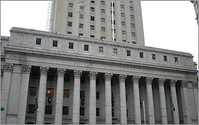
Google, Facebook and Twitter are among a host of tech companies that are backing the video-sharing site Vimeo in its battle with record labels.
The tech companies are urging the 2nd
Circuit Court of Appeals to rule that Vimeo is entitled to rely on the Digital Millennium Copyright Act's “safe harbor” provisions, which protect Web platforms from liability when users
upload infringing material.
The battle between Vimeo and the record labels dates to 2009, when Capitol Records sued Vimeo in federal court in Manhattan for hosting “lip dubs” -- or
videos of people lip-synching.
U.S. District Court Judge Ronnie Abrams ruled earlier this year that Vimeo was entitled to rely on the safe harbors for many of the clips that allegedly
infringed copyright, but also ruled that the company could potentially face liability for some clips with “well-known” songs.
advertisement
advertisement
The safe harbors generally provide that companies are
immune from liability for copyright infringement by users, as long as the companies remove the material upon request. But the safe harbors have some exceptions, including one for companies that know
about infringement.
Abrams said the record companies were entitled to proceed with allegations regarding 18 clips, on the theory that Vimeo should have known those clips weren't authorized.
All 18 used “well known” music and appear to have been viewed by at least one Vimeo employee.
Abrams also ruled that Vimeo was ineligible for the safe harbor protections for any
clips that used pre-1972 music.
Vimeo is appealing both of those rulings to the 2nd Circuit.
The company argues that even if its employees noticed clips with “well-known”
music, the employees didn't have enough information to conclude that those clips infringed copyright. For instance, Vimeo says, the clips wouldn't have been infringing if the uploader licensed the
music, or was protected by fair use principles.
On Wednesday Google, Facebook, Yahoo and Microsoft filed a friend-of-the-court brief backing Vimeo's argument. “Employees reviewing
content cannot determine infringement based only on the popularity or length of content,” they argue. “The DMCA recognizes this, and thus its application does not turn on assumptions about
whether copyrighted works are 'well known.'”
Twitter, Tumblr and Pinterest make a similar point in a separate friend-of-the-court brief, which points out that content owners often
instruct their agents to upload material to social media platforms. “Copyright owners large and small recognize the value of user-generated content services in helping generate 'buzz,'”
the companies state. “On Twitter, for example, a studio wishing to market a movie or a television show will often have their staff ... post Tweets with promotional content.”
Vimeo
and its supporters also are asking the appeals court to rule that the safe harbors apply to music recorded before 1972.
To date, different judges have reached different conclusions about that
question. A New York appellate court ruled last year in a case involving Grooveshark that the safe harbors don't apply to pre-1972 music. But a federal judge ruled in a lawsuit concerning MP3tunes.com
that the safe harbors apply to older music.
Vimeo says that companies such as itself have no practical way to distinguish pre-1972 recordings from newer ones. “Should all staff be
expected to know that most of the tracks on the Rolling Stones’ Exile on Main Street album were recorded between June 1969 and February 1972, even though the album itself was not released until
May 1972?” the company asks. “How many people can distinguish between a 1960 recording and a 1980 recording of Gershwin’s 'Rhapsody in Blue?'”
The Electronic Frontier
Foundation and other digital rights groups filed separate court papers, also backing Vimeo. Those groups add that treating pre-1972 and post-1972 music differently would “create an impossible
burden for service providers and would stifle innovation.”